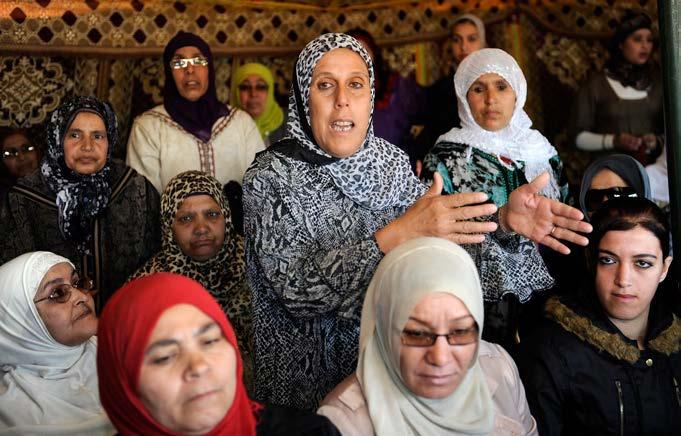IDLO
4. Gender-focused engagement entry points, modalities and good practices for customary and informal justice systems
The relationship between women’s rights and CIJ is complex. CIJ systems are widely used by women, as they routinely deal with common justice concerns that women face, yet women are confronted with a range of challenges in obtaining justice through CIJ systems. These challenges must remain in focus when considering how to expand and strengthen women’s access to justice based on the growing range of models, lessons and approaches that can be utilized to identify opportunities for engagement, whether direct, indirect or strategic.79 It is important to recognize that CIJ systems encompass an “enormous range of practices, institutions and traditions”, highlighting “the dangers
of deriving general conclusions from specific regional and historical contexts”.80 The appropriateness and manner of engagement must thus be rooted in context and characteristics of a particular CIJ system, identifying optimal entry points that respond to justice needs while protecting and promoting human rights.81 Importantly, all justice systems are reflective of the socio-political context in which they are situated.82 Detailed below are a range of entry points and good practices for designing and implementing programs that engage with CIJ systems to promote justice for all. The aim is to find ways to overcome dysfunctional dispute resolution and introduce reforms that are both
accepted socially and locally and sustainable under international law.83 At times, this may mean nonengagement, or engagement through supplementary or indirect routes. Identified entry points are clustered around five main engagement areas: (i) empowering women to achieve justice; (ii) adopting and implementing normative frameworks that benefit women and protect their rights; (iii) pursuing gender-sensitive reform of CIJ systems; (iv) building and expanding alliances and partnerships that support women’s rights; and (v) strengthening research on women’s experiences with CIJ systems. These are complemented by specific engagement modalities to ensure women’s rights are central and indispensable.
Empower women to achieve justice Empowering women to achieve justice through CIJ systems requires enhancing women’s knowledge of their rights and the law, addressing access challenges, facilitating women’s mobilization within CIJ systems and providing support to navigate the range of justice mechanisms available. Customary legal empowerment “requires paying attention to issues of representation and participation of marginalized community members in [customary justice systems]… and their ability to make use of these systems to uphold their rights and obtain outcomes that are fair and equitable”.84
Strengthen women’s knowledge of the law and their rights Knowledge about their rights and content of existing laws, both formal and customary, and the pathways to seek redress in instances of rights violations can assist women in making more informed choices about when to take legal action, and through which avenues. There are several ways in which this knowledge can provide assistance.
First, knowing the rights that women are entitled to under international human rights frameworks can help to build demand for improvements in women’s position and solidarity with other women. Although optimal, this need not always be framed in the language of human rights, where this may be sensitive or trigger resistance. It is important to speak to the shared challenges women face within a particular context to help build the collective consciousness of women in ways that support contestation of dominant power relations.
17






